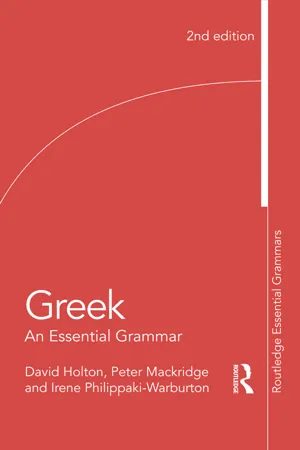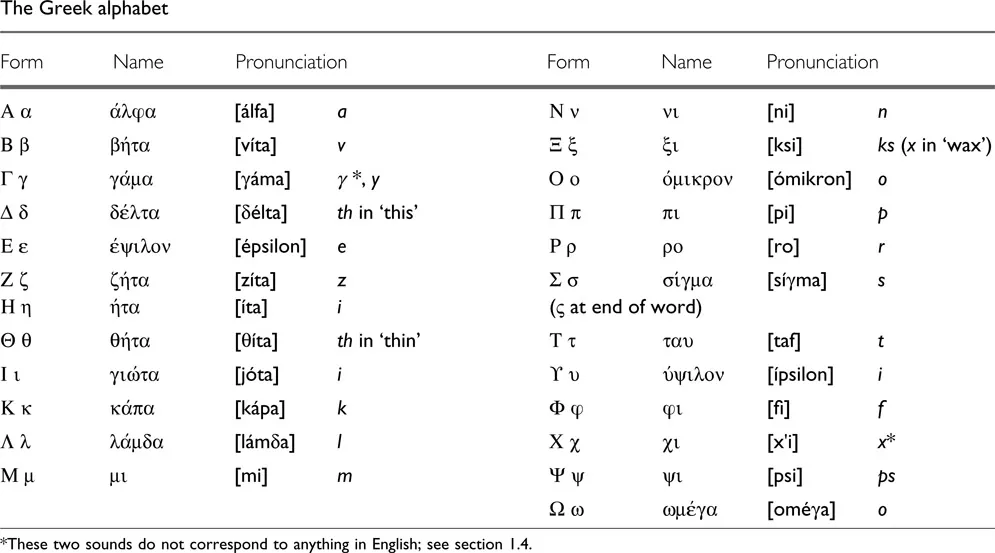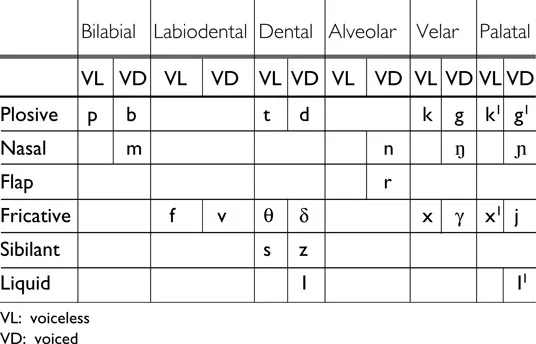
eBook - ePub
Greek: An Essential Grammar of the Modern Language
- 280 pages
- English
- ePUB (mobile friendly)
- Available on iOS & Android
eBook - ePub
Greek: An Essential Grammar of the Modern Language
About this book
Greek: An Essential Grammar is a concise and user-friendly reference guide to modern Greek. It presents a fresh and accessible description of the language in short, readable sections. Explanations are clear and supported by examples throughout.
This new edition has been revised and updated to present an accurate and accessible description of the most important aspects of modern Greek.
Features include:
- clear and up-to-date examples
- special attention to those points which often cause problems to English-speaking learners
- Greek/English comparisons and contrasts highlighted throughout.
Greek: An Essential Grammar is ideal for learners involved in independent study and for students in schools, colleges, universities and adult classes of all types.
Levels CEFR scale A1-B2 and ACTFL level Low-Intermediate to Advanced.
Frequently asked questions
Yes, you can cancel anytime from the Subscription tab in your account settings on the Perlego website. Your subscription will stay active until the end of your current billing period. Learn how to cancel your subscription.
No, books cannot be downloaded as external files, such as PDFs, for use outside of Perlego. However, you can download books within the Perlego app for offline reading on mobile or tablet. Learn more here.
Perlego offers two plans: Essential and Complete
- Essential is ideal for learners and professionals who enjoy exploring a wide range of subjects. Access the Essential Library with 800,000+ trusted titles and best-sellers across business, personal growth, and the humanities. Includes unlimited reading time and Standard Read Aloud voice.
- Complete: Perfect for advanced learners and researchers needing full, unrestricted access. Unlock 1.4M+ books across hundreds of subjects, including academic and specialized titles. The Complete Plan also includes advanced features like Premium Read Aloud and Research Assistant.
We are an online textbook subscription service, where you can get access to an entire online library for less than the price of a single book per month. With over 1 million books across 1000+ topics, we’ve got you covered! Learn more here.
Look out for the read-aloud symbol on your next book to see if you can listen to it. The read-aloud tool reads text aloud for you, highlighting the text as it is being read. You can pause it, speed it up and slow it down. Learn more here.
Yes! You can use the Perlego app on both iOS or Android devices to read anytime, anywhere — even offline. Perfect for commutes or when you’re on the go.
Please note we cannot support devices running on iOS 13 and Android 7 or earlier. Learn more about using the app.
Please note we cannot support devices running on iOS 13 and Android 7 or earlier. Learn more about using the app.
Yes, you can access Greek: An Essential Grammar of the Modern Language by David Holton,Peter Mackridge,Irene Philippaki-Warburton,Michalis Georgiafentis in PDF and/or ePUB format, as well as other popular books in Languages & Linguistics & Languages. We have over one million books available in our catalogue for you to explore.
Information
1
The alphabet and pronunciation
In this section we focus on letters, while in sections 1.2–1.8 we concentrate on sounds.
1.1 The Greek alphabet
The Greek alphabet consists of twenty-four letters. The table on page 2 presents each letter (in upper and lower case) in alphabetical order, its Greek name, and its basic pronunciation (for further details of pronunciation see sections 1.2–1.6).
Anyone who knows how to pronounce the Greek letters can pronounce any written word in the language; this is unlike English, where we often don’t know how a word is pronounced unless we have heard it spoken. On the other hand, as in English, it is often impossible to tell how to spell a word that we have heard spoken.
Taken on their own, seven letters of the alphabet represent vowel sounds (α, ε, η, ι, ο, υ, ω), and seventeen represent consonant sounds (all the rest). But when some letters are combined together, they are pronounced differently. Each of the following combinations represents a single sound:
| αι | /e/ |
| ει | /i/ |
| οι | /i/ |
| ου | /u/ |
| υι | /i/ |
The combination αυ is pronounced [af] at the end of a word and before the following consonants: π, τ, κ, φ, θ, χ, σ, ξ, ψ, but [av] before a vowel or any other consonant (i.e. β, δ, γ, ζ, λ, ρ, μ, ν). Similarly, ευ is pronounced [ef] or [ev] in the same positions, and the rare combination ηυ is pronounced [if] or [iv].

Pairs of identical consonants are pronounced like a single consonant, except γγ, which is pronounced [(ŋ)g] or [(ŋ)g'] (see section 1.4). In addition, the following combinations of letters representing consonants are pronounced in a special way:
| γκ | like γγ (see above) |
| γχ | [ŋx] |
| μπ | [(m)b] |
| ντ | [(n)d] |
| τζ | [dz] |
Finally, σ is pronounced [z] before a voiced consonant (β, γ, δ, ρ, μ, ν).
Pronunciation
1.2 Vowels
The Greek sound system has five distinct vowels: /i, e, a, o, u/.
The vowel /i/ is pronounced between the English vowel in ‘bit’ and that in ‘beat’. The Greek vowel /i/ corresponds to six different spellings: ι, η, υ, οι, ει and υι, e.g. το παιδί [to peδí] ‘the child’, Ελένη [eléni] ‘Helen’, πολύ [polí] ‘very, much’, οι κόποι [i kópi] ‘the labours’, μπορεί [borí] ‘maybe’, υιοθετώ [ioθetó] ‘I adopt’.
The vowel /e/ is pronounced like the English vowel /e/ in ‘kept’ but it is pronounced slightly longer and with lips more open. The Greek /e/ corresponds to two different spellings: ε and αι, e.g. λένε [léne] ‘they say’, κλαίνε [kléne] ‘they cry’.
The vowel /a/ is similar to the a in ‘father’. It corresponds to the spelling α, e.g. η Mαρία [i maría] ‘Mary’.
The vowel /ο/ is pronounced between the English vowel in ‘pot’ and that in ‘bought’ but the lips are slightly more closed and more rounded. The vowel /o/ corresponds to two different spellings: ο and ω, e.g. το δώρο [to δóro] ‘the present’.
The vowel /u/ is somewhere between the vowels in the English words ‘put’ and ‘boot’. It corresponds to the spelling ου, e.g. του παιδιού [tu peδjú] ‘of the child’.
The vowel /i/ may lose its vowel quality and become non-syllabic if unstressed and followed by another vowel.
Non-syllabic /i/ is pronounced as [j] (like the y in ‘yes’) if it follows a voiced consonant [b, d, g, v, δ, γ, z, r, m], as in παιδιά [peδjá] ‘children’ (contrast παιδεία [peδía] ‘education’), or as voiceless [x'] (pronounced like the h in ‘huge’) if it follows a voiceless consonant [p, t, k, f, θ, x, s], as in ράφια [ráfx'a] ‘shelves’. This general reduction of /i/ to [j] or [x'] does not apply to words from the more formal vocabulary: compare βιολί [vjolí] ‘violin’ with βιολόγος [violόγos] ‘biologist’.
1.3 Combinations of vowels
Combinations of two or three vowels are possible, e.g. νεαρός [nearós] ‘young man’, νεοελληνικός [neoelinikόs] ‘modern Greek’. In words like ρολόι /rolói/ ‘clock, watch’, πάει /pái/ ‘it goes’ and λέει /léi/ ‘(s)he/it says’, where the unstressed /i/ follows a vowel, the /ói/, /ái/, /éi/ are pronounced as in the English words ‘toy’, ‘spy’, ‘stay’, respectively.
1.4 Consonants
There are twenty-five consonant sounds, which we represent by the following symbols: p, t, k, b, d, g, f, θ, x, v, δ, γ, k', x’, g’, j, s, z, l, l’, r, m, n, ŋ.

The voiceless plosives [p], [t] and [k] are pronounced like their English equivalents in ‘spot’, ‘stay’ and ‘scot’ respectively. However, unlike their English counterparts, these Greek consonants remain without aspiration (expulsion of breath) even in initial position before a vowel.
The voiceless bilabial plosive [p] corresponds to the spelling π, e.g. ο πατέρας [opatéras] ‘the father’, κάπως [kápos] ‘somewhat’.
The voiceless dental plosive [t] corresponds to the spelling τ, e.g. το ποτό [topotó] ‘the drink’.
The voiceless velar plosive [k] corresponds to the spelling κ, e.g. καλός [kalós] ‘good’, ακόμη [akόmi] ‘still’. [k] has a variant [k’], which is pronounced like the first consonant in the English word ‘queue’, before the vowels /e/ and /i/, e.g. κέφι [k’éfi] ‘good mood’, εκείνος [ek’ínos] ‘that one’.
The voiced bilabial plosive [b] corresponds to the spelling μπ. It is optionally preceded by a short [m] when it is within a word, e.g. κουμπάρος [ku(m)báros] ‘best man’. This preceding nasal is generally absent when [b] occurs at the beginning of a word, e.g. μπότα [bóta] ‘boot’.
The voiced dental plosive [d] corresponds to t...
Table of contents
- Cover
- Title
- Copyright
- Contents
- Preface to the first edition
- Preface to the second edition
- Abbreviations and symbols
- Chapter 1 The alphabet and pronunciation
- Chapter 2 The writing system
- Chapter 3 The noun and the noun phrase
- Chapter 4 Pronouns and determiners
- Chapter 5 Numerals
- Chapter 6 The verb and the verb phrase
- Chapter 7 The adverb and the adverbial phrase
- Chapter 8 The preposition and the prepositional phrase
- Chapter 9 Conjunctions and particles
- Chapter 10 The clause
- Chapter 11 Word formation
- Chapter 12 Conversational features
- Appendices
- Glossary of grammatical terms
- Some recommended books for further study
- Index of grammatical categories and concepts
- Index of Greek words